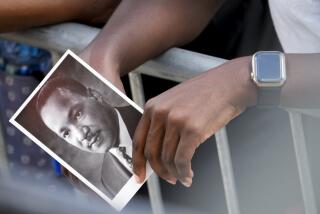Dreams, Disillusions and New Resolutions
- Share via
Thirty-eight years of change. But has there been so much change?
The same human dramas of 38 years ago are still “playing” today, occupying center stage for my synagogue families, seemingly unchanged through the elapsed decades.
The bar mitzvah boy proudly asserting his manhood with a high-pitched voice and shaking knees. The bravado and macho-posing of the bridegroom seeking to conceal the terror gripping him as he lines up for the wedding procession. The widow’s bitter tears as she stands before her husband’s open grave just weeks after standing at his side while celebrating their 50th wedding anniversary.
Or the woman sitting nervously across my study desk who finally brings herself to say the words, “I know I should be happy, Rabbi, but I am not . . . and some days I even wonder to myself if my life is worth living. . . .”
Each of these experiences of mine as a rabbi of a congregation back in 1960 has already been replicated in 1998. So has there really been a change? People, after all, are people.
Yes, there has.
In 1960, people had dreams and believed in them. Now, on the threshold of the 21st century, so many are afraid to dream because of the bitter price of disillusionment one expects to pay for unfulfilled dreams.
Back in the ‘60s, “And they lived happily ever after,” was a dream with credibility. No more. I recently met with a young couple engaged to be married. They sat rigidly at opposite ends of the couch, arms crossed, their body language remote and chilly. Their spoken language likewise lacked intimacy and warmth. I asked if anything was wrong. “Forgive me for being blunt, but the two of you don’t seem to be happy.” His reply, “Rabbi, how would you feel if you were about to cross a street and the odds were 50-50 you’d get hit by a truck?”
Perhaps an understandable sentiment, divorce statistics being what they are. But what a way to express the thought and what a setting to do so! As for the bride-to-be’s reaction: She just nodded her head.
Back in the ‘60s, the American dream of success along with the equation of “success equals happiness” were accepted as truisms by most. Madison Avenue promised us, via the TV screen, that if we were the first on our block to have that shiny red wagon, everyone would love us, that if we dressed in the right clothes, took the right vacations and owned the right things, then instant and eternal happiness would be ours to enjoy.
That dream too has become a nightmare for many in the ‘90s. “I finally got what I wanted, so tell me, please, why do I feel so empty inside?” is the oft-heard refrain reverberating in the study of many a priest, minister and rabbi today. Clearly, Madison Avenue is incapable of providing us with a sense of purpose or Godliness in our lives. Neither the 99 Cents store nor Kmart, not even Bloomingdale’s carries such merchandise.
Shattered dreams may be sad, but they are not necessarily bad.
A new realism vis-a-vis marriage has led many young people to think more in terms of commitment and responsibility then just ecstatic love, and to accept the profound truth inherent in the cliche that “we” must precede “I” in “wedding.”
And the fallacy inherent in the slogan, “He who dies with the most toys wins,” has led many to undertake a deep religious search.
So instead of delivering book reviews (standard pulpit practice in the ‘60s), I most often teach directly from the text of the Torah. Instead of self-conscious, ritually embarrassed Jewish youth trying desperately to blend inconspicuously into the American WASPish landscape, I now see yarmulkes (skull caps) worn ubiquitously and I frequently sign requests for those wishing to take SATs on days other than the Sabbath. Instead of the theological embarrassment characteristic of the ‘60s with its attendant discomfiture with such words as “God,” “prayer” and “spirituality,” today God is in and prayer is in and spirituality is in.
Thirty-eight years. What a blessing it has been to have been privileged to share in it all . . . dreams, disillusions and new resolutions.
More to Read
Sign up for Essential California
The most important California stories and recommendations in your inbox every morning.
You may occasionally receive promotional content from the Los Angeles Times.













